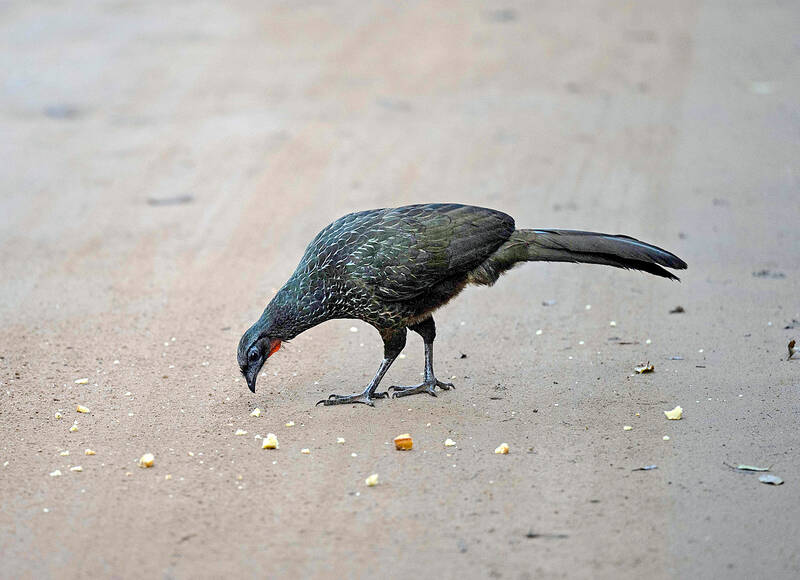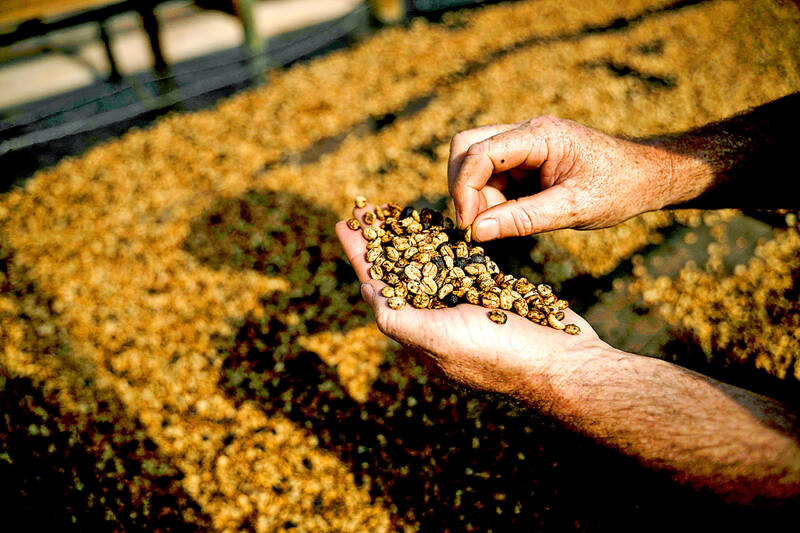In Brazil, the proverbial goose that lays the golden egg is in reality something closer to a pheasant that excretes coffee beans.
At the Camocim coffee farm, deep in the bucolic hills of Espirito Santo state in Brazil’s southeast, jacus — a type of pheasant native to tropical forests there — are considered some of the most astute pickers — or rather, eaters — of coffee cherries.
“He chooses the best fruits, the ripest,” said worker Agnael Costa, 23, delicately scooping up droppings left behind by one of the birds between two tree trunks. What goes in as ripe cherries comes out as beans, which can go on to be sold as some of the most delicious — and expensive — coffee in the world.

Photo: AFP
The coffee at Camocim grows in the middle of the lush forest, and the jacus there are wild.
“It was this agroforestry system that created the necessary conditions for this exotic coffee to exist here,” farm owner Henrique Sloper said.
Domestically, jacu coffee can sell for 1,118 reals (US$224) per kilogram — a price that can rise significantly upon export. Foreign distributors include British department store Harrods, among others.

Photo: AFP
The jacu, with its black feathers and red throat, was not always welcome at the farm. It was originally seen as a hungry pest feeding off precious crops.
However, when Sloper discovered “kopi luwak,” an expensive Indonesian coffee made with beans from civet excrement, he figured jacus might make good allies in the quest to make a better brew.
Kopi luwak sometimes has a bad reputation, with farmers accused of pressing civets — small mammals similar to weasels — into captivity to boost production. The wild jacus at Camocim roam, eat and poop at their leisure.
“It’s 100 percent natural,” farm production supervisor Rogerio Lemke said.
“The jacu is within its own natural habitat,” in Brazil’s Atlantic Forest, he added.
Linking production to the whims of a jacu’s appetite is just one of the reasons it fetches such a high price.
Jacu droppings look a bit like a cereal bar, with beige grains protruding from a blackish, pasty mess. Once collected and dried, the beans are carefully sorted and hulled, and put into a chilled room.
“It is naturally expensive. There is no way to make a jacu coffee at a low cost,” Sloper said.
All told, jacu coffee represents less than 2 percent of the estate’s production.
The bird also carries other advantages, for farmers and those seeking a cheaper — if less intestinally intimate — cup of Joe.
“It serves not only as a selector [of the best beans], but also as a harvest alarm” Sloper said. “Where it eats, the coffee is ripe.”
While jacus help select the best coffee, there is nothing in particular about their digestive system that imparts a different taste on the beans.
“The birds have an extremely short intestinal transit time,” coffee specialist Ensei Neto said. “So there is not exactly any kind of biochemical process, there is no time.”
Their digestive process is much faster than civets or elephants — another animal whose dung is used, in Thailand, to produce specialty coffee. Some think the fermentation process stemming from those animals’ longer digestion times imparts a better flavor on the resulting beans.
The jacu “only goes for the ripe fruits,” producing a coffee with “sweet notes, with good acidity,” Neto said. “It doesn’t add anything else, but the story is good.”
The jacus have found a fan in Poliana Cristiana Prego, 37, a Brazilian tourist who has come to visit Camocim.
“It’s a delicious coffee and the story behind its production is very original. It’s a new experience for us,” she said.
“Our customers are lovers of exotic products, but also those who value the idea of sustainable development,” Sloper said.
“The future of coffee will come from Brazil,” he said.
The country is already the world’s top producer.
Whether it comes from jacus or otherwise, Brazilian coffee “is showing the world that we really are able to do what nobody else can,” Sloper said.

The US dollar was trading at NT$29.7 at 10am today on the Taipei Foreign Exchange, as the New Taiwan dollar gained NT$1.364 from the previous close last week. The NT dollar continued to rise today, after surging 3.07 percent on Friday. After opening at NT$30.91, the NT dollar gained more than NT$1 in just 15 minutes, briefly passing the NT$30 mark. Before the US Department of the Treasury's semi-annual currency report came out, expectations that the NT dollar would keep rising were already building. The NT dollar on Friday closed at NT$31.064, up by NT$0.953 — a 3.07 percent single-day gain. Today,

‘SHORT TERM’: The local currency would likely remain strong in the near term, driven by anticipated US trade pressure, capital inflows and expectations of a US Fed rate cut The US dollar is expected to fall below NT$30 in the near term, as traders anticipate increased pressure from Washington for Taiwan to allow the New Taiwan dollar to appreciate, Cathay United Bank (國泰世華銀行) chief economist Lin Chi-chao (林啟超) said. Following a sharp drop in the greenback against the NT dollar on Friday, Lin told the Central News Agency that the local currency is likely to remain strong in the short term, driven in part by market psychology surrounding anticipated US policy pressure. On Friday, the US dollar fell NT$0.953, or 3.07 percent, closing at NT$31.064 — its lowest level since Jan.

The New Taiwan dollar and Taiwanese stocks surged on signs that trade tensions between the world’s top two economies might start easing and as US tech earnings boosted the outlook of the nation’s semiconductor exports. The NT dollar strengthened as much as 3.8 percent versus the US dollar to 30.815, the biggest intraday gain since January 2011, closing at NT$31.064. The benchmark TAIEX jumped 2.73 percent to outperform the region’s equity gauges. Outlook for global trade improved after China said it is assessing possible trade talks with the US, providing a boost for the nation’s currency and shares. As the NT dollar

The Financial Supervisory Commission (FSC) yesterday met with some of the nation’s largest insurance companies as a skyrocketing New Taiwan dollar piles pressure on their hundreds of billions of dollars in US bond investments. The commission has asked some life insurance firms, among the biggest Asian holders of US debt, to discuss how the rapidly strengthening NT dollar has impacted their operations, people familiar with the matter said. The meeting took place as the NT dollar jumped as much as 5 percent yesterday, its biggest intraday gain in more than three decades. The local currency surged as exporters rushed to